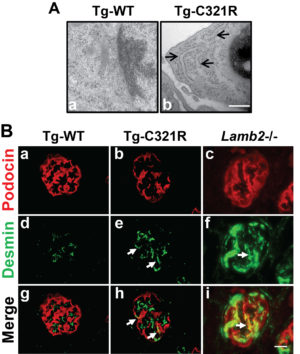 Congratulations to Assistant Professor of Medicine Ying (Maggie) Chen, MD, PhD, who has been awarded a five-year $1.52M total costs, R01 grant from the NIH to fund a research project titled Podocyte Endoplasmic Reticulum Stress and Nephrotic Syndrome.
Congratulations to Assistant Professor of Medicine Ying (Maggie) Chen, MD, PhD, who has been awarded a five-year $1.52M total costs, R01 grant from the NIH to fund a research project titled Podocyte Endoplasmic Reticulum Stress and Nephrotic Syndrome.
Nephrotic syndrome (NS), characterized by heavy proteinuria and increased risk of loss of kidney function, causes serious morbidity and high mortality. It accounts for 15% of prevalent end-stage renal disease at an annual cost of more than $3 billion in the U.S.
There is no effective treatment for most cases of NS caused by genetic mutations.
 “Our research focuses on developing novel mechanistic therapeutic strategies for primary NS,” says Dr. Chen. “Using our monogenic NS mouse model, we found that podocyte endoplasmic reticulum (ER) stress leads to podocyte injury and proteinuria. In addition, an ER stress-specific CHOP pro-apoptotic pathway is activated. We will investigate the therapeutic importance of multiple innovative treatment approaches to target this death pathway.” Her team will also delineate the contribution of podocyte ER stress in NS patients carrying possible deleterious missense variants.
“Our research focuses on developing novel mechanistic therapeutic strategies for primary NS,” says Dr. Chen. “Using our monogenic NS mouse model, we found that podocyte endoplasmic reticulum (ER) stress leads to podocyte injury and proteinuria. In addition, an ER stress-specific CHOP pro-apoptotic pathway is activated. We will investigate the therapeutic importance of multiple innovative treatment approaches to target this death pathway.” Her team will also delineate the contribution of podocyte ER stress in NS patients carrying possible deleterious missense variants.
Chen will use mouse genetic models and access two major human NS cohorts, the Nephrotic Syndrome Study Network (NEPTUNE) and the Washington University Kidney Translational Research Core (WU KTRC) in the investigation.
“The study will help us classify NS patients based on underlying molecular mechanisms, stratify disease risk, and discover highly-targeted treatments for NS patients caused by podocyte ER dysfunction in the era of precision nephrology,” says Chen.